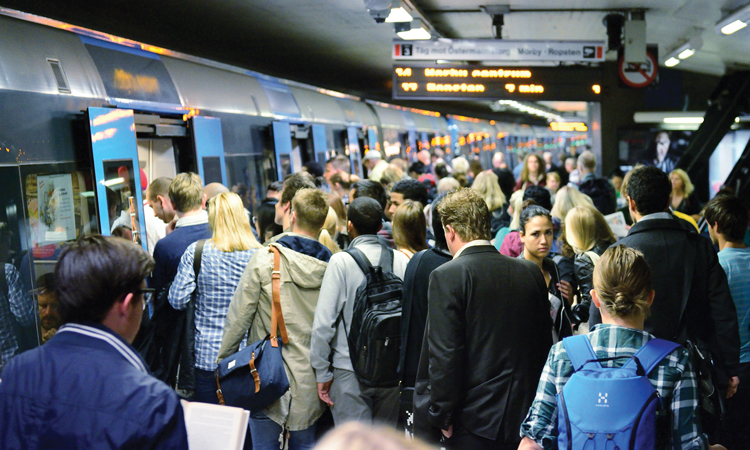Passenger transport security: preparing for and managing major events
- Like
- Digg
- Del
- Tumblr
- VKontakte
- Buffer
- Love This
- Odnoklassniki
- Meneame
- Blogger
- Amazon
- Yahoo Mail
- Gmail
- AOL
- Newsvine
- HackerNews
- Evernote
- MySpace
- Mail.ru
- Viadeo
- Line
- Comments
- Yummly
- SMS
- Viber
- Telegram
- Subscribe
- Skype
- Facebook Messenger
- Kakao
- LiveJournal
- Yammer
- Edgar
- Fintel
- Mix
- Instapaper
- Copy Link
Posted: 15 April 2014 | Geoff Dunmore | No comments yet
Passenger transport systems in large cities face immense daily challenges to move millions of people in a safe and secure manner. To do this, public transport systems must be reliable and provide ease of access – failure to provide this can result in congestion, passenger delays and reputational risk which can have a serious impact on the economy of cities and even nations. When major events such as the Olympic Games or international football tournaments are added to the mix, it alters the risk profile for the public transport system significantly and can have an impact on mobility, travel reliability and sustainability.


Scale
The Olympic and Paralympic Games are the first and second largest sporting competitions with high numbers of participants, officials, press and spectators travelling to multiple venues across a city. International football tournaments involve large numbers of spectators but are spread across more cities each coping with a limited number of games. Typically, these events are held over a prolonged period of 3-4 weeks, or more, and are often geographically spread which can be a drain on critical resources and be a challenge for resilience. Another important dimension to consider is that the world is coming to visit through the international spectators and most critically the international media. If handled well it can have a positive effect and provide a massive boost to tourism and trade for the years that follow.
Event locations can be well protected by installing ‘security rings’ of infrastructure security measures and airport-style security screening and although this carries time penalties, event spectators are usually willing to accept them.
This approach to security is not feasible when it comes to mass passenger transport systems as the time penalties are neither acceptable nor practical. Unless spectators can be totally segregated from normal users then other subtle measures or security layers have to be adopted that are proportionate to the risk.
Planning and preparation
To achieve the main purpose of moving millions of people from A to B as quickly and as safely as possible, public transport operators have to assess the risks to their operations and have robust plans to overcome a multitude of eventualities and challenges. This attention to risk assessment has resulted in passenger transport systems becoming the safest form of transport, despite the inherent vulnerability from congestion, criminality and terrorism.
Early planning and preparation is vital. The planning for the London Olympic and Paralympic Games actually started in 2003 with the preparation of the bid. At this stage, and later during the events, the most important factor is a true partnership approach with early collaboration, input and participation between all interested parties including the event sponsors, event planners, stadium operators, national and local government, local authorities, police, emergency services, military, transport authorities and transport operators and other key utilities.
It will require agency specific and joint risk assessments, critically for transport providers, to develop an understanding by all agencies of potential adverse impacts on service provision. For passenger transport the risk appetite has to be understood and accepted by all parties. This can require a massive shift from the normal risk adverse approach with some security professionals.
This will also help identify any additional contingency plans required and any investment requirements which are above business as usual and will need specific funding – such as joint communication and co-ordination centres, training, additional manpower and other resource requirements.
Joint exercises and simulations will need to test capabilities and aid joint understanding through table-top simulations, command and control tests and live exercises. Simulations are preferable as it enables more participants to be directly involved and lessons learnt are easily transferable.
The resilience of senior managers and those in command and control roles need to be carefully catered for as the events will typically require three-shift-coverage over prolonged periods of time.
Maintenance schedules will need to be reviewed to avoid any heavy maintenance and to carry out only essential maintenance to increase asset availability during the event window.
Let the games begin
The collaboration and communication developed between all agencies during the planning stage will need to be continued during the event window. There will be a need to continuously monitor and assess situations. This will aid responses to emerging situations and allow early resolution of any problems or potential misunderstandings. The staffing of any joint communications and co-ordination centres will benefit from having representatives of key agencies who have a good understanding of jointly agreed aims and objectives.
The importance of reliability cannot be underestimated for safety and security on passenger transport systems – relentless focus on regular reliable services prevents congestion and provides certainty which, in turn, breeds confidence for users and increases the feeling of personal security whilst on the system.
Part of the preparation for transport providers will require reaching out to businesses to give them advance information on the impact of the event on normal services. In London it was recognised that demand would exceed capacity at critical times and locations. The Travel Demand Management Programme gave businesses, normal users and spectators useful advanced information to enable them to plan their journeys. Real-time service information is another important aspect that can give passengers more confidence in the system. Social media is now recognised as an excellent medium to give pre-service and real-time service information and is ideal for major events to reach target audiences.
Media relationships are a key area for managing reputational risks and should be developed for the domestic market to also publicise transport information, as well as positively engendering an open approach. Overseas media representatives could have a positive impact on future trade and tourism.
A customer service approach through the operator’s staff or private contractors is also an essential security layer as it provides reassurance for infrequent users and provides an ‘on-the-spot’ dynamic response to emerging situations and incident management. It also augments the natural surveillance in the operational environment. Engendering a proactive engagement approach leads to an even greater customer experience and perception of security.
Ambassadors
The nature of the major events often result in prolonged periods of heavy crowding, often outside the normal peaks, or at locations that do not normally experience such high volumes, or at transport hubs away from the event but likely to be inundated as an alternative. Volunteer or additional resources will be required. These ‘ambassadors’ have become synonymous with many of the Olympics, football tournaments and other major events over many years. An approach adopted by many operators, particularly for football events, is to invite employees from other countries transport operators to assist with customer service at their home nation’s fixtures.
It is vital that ‘ambassadors’ and other external resources drafted in to assist transport operators during the events receive familiarisation training to ensure they understand the core purpose and the implications to the reliability of the service if their actions or decisions are well-meant or misguided.
It is worthwhile investing time and effort to have a programme to engage with employees and ambassadors in a ‘hearts and mind’ campaign to build enthusiasm and a good understanding of the aims and objectives during the events.
Response strategies developed during the planning stage will be put to good use, but such plans need to be flexible enough to deal with situational changes and emerging threats. Even with the best planning and preparation there will be incidents and situations that will require a dynamic response. So plans and resources will need to be flexible enough to account for this and give senior managers the opportunity to adapt to varying situations. An example of this was during the London 2012 Olympics where the Transport for London ‘ambassadors’ were redeployed to work directly in the Olympic Park with the objective of encouraging spectators to use alternative public transport routes to ease the pressure on the Stratford interchange at key ‘bump-out’ times. This had the impact of shifting 30% of the traffic away from Stratford at the key times.
Alternative viewing sites away from the main event locations have become a useful tool to help reduce congestion around stadia, and still allow a greater number to experience the events. These locations will also require additional resources.
Conclusion
Passenger transport systems are one of the most complex and critical to the success of large-scale events. They are one of the primary stakeholders and need to be involved in the early stages of planning and preparation.
Any security measures deployed must be proportionate to the risk and not be counter-productive to service provision and reliability.
Partnerships must be nurtured and will require constant participation and involvement at all stages over the many years prior to the event.
A relentless focus on reliability is crucial – reliability, pre-use and real-time information and customer service engagement are key layers for security in public transport systems.
Continuously monitoring service provisions across all transport modes, and to expedite corrective action, is important.
Contingency plans will need to be augmented to address new risks identified. Flexibility and extra resilience will be required to address emerging threats and adapt to changing situations.
External security personnel who will be deployed in support of the public transport systems will need to have familiarisation training to understand the importance of reliability and keep traffic flowing.
One of the underlying objectives of Transport for London for the 2012 London Olympic Games was that the headlines should be about ‘sport’ and not ‘transport’. This was truly exceeded with nothing but positive headlines for the transport services.
Biography


Related topics
Security & Crime, Traffic Management, Vehicle & Passenger Safety
Issue
Issue 2 2014
Related people
Geoff Dunmore







